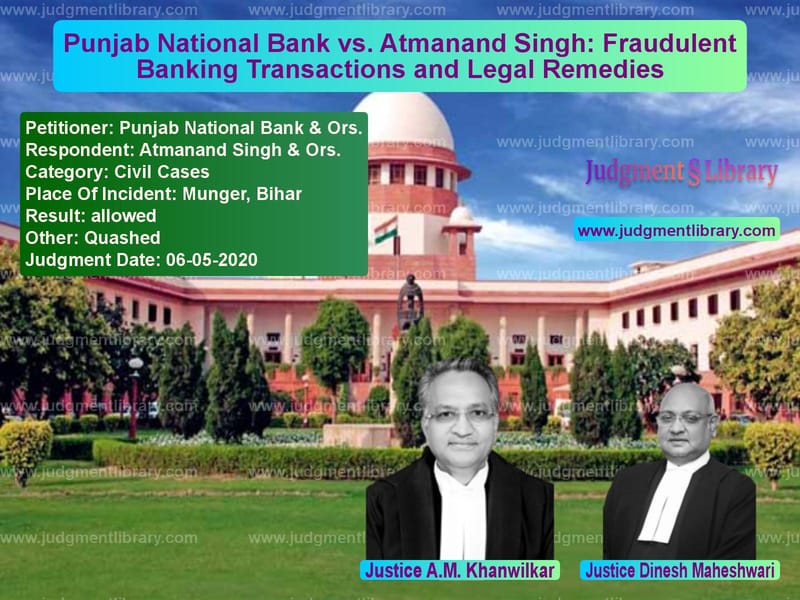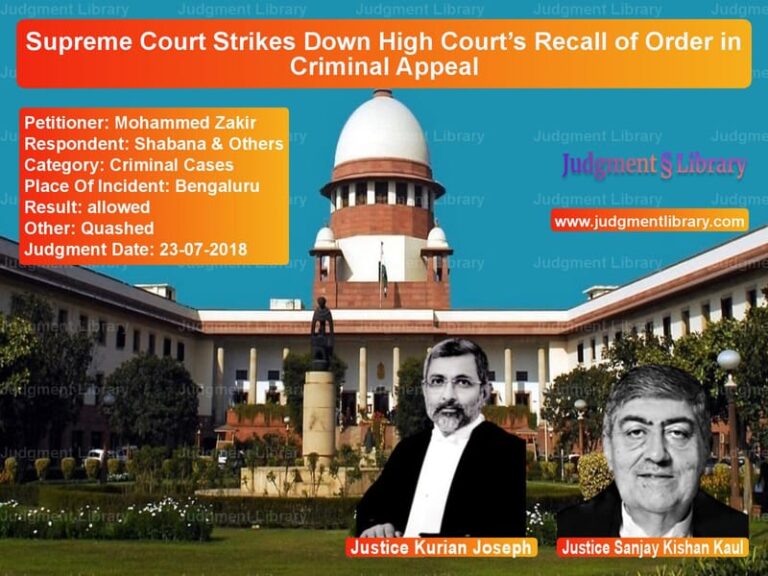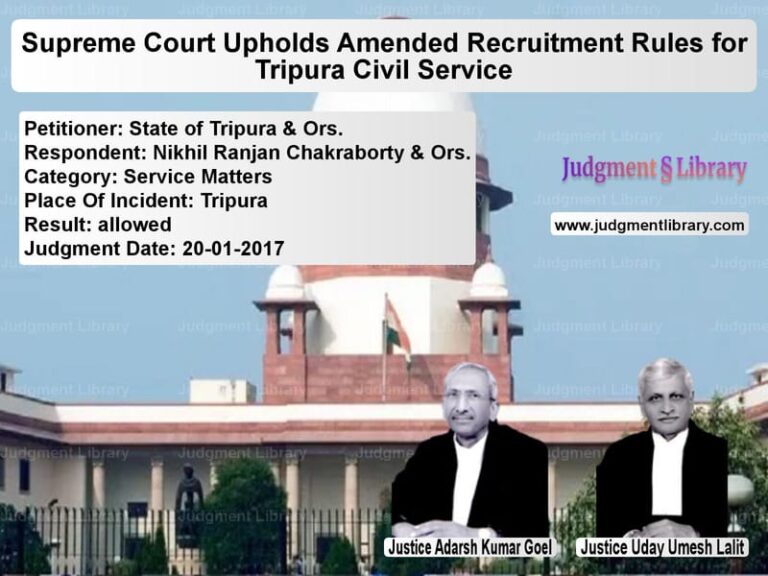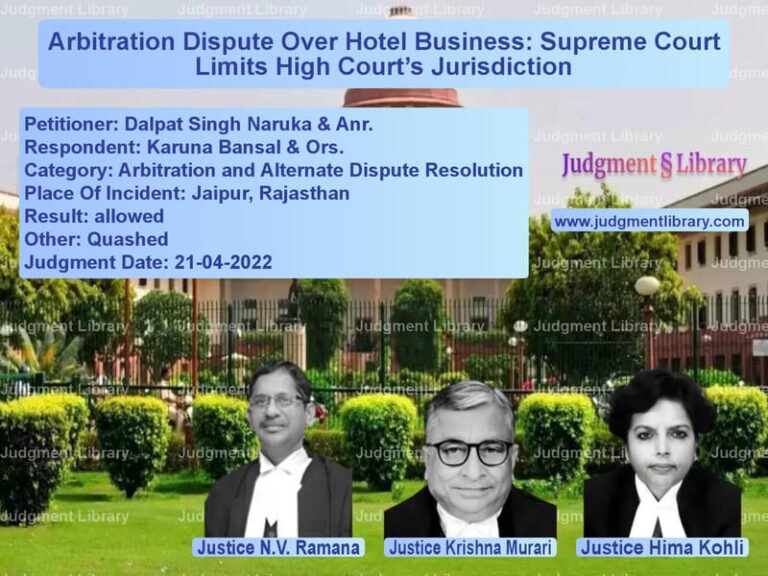Punjab National Bank vs. Atmanand Singh: Fraudulent Banking Transactions and Legal Remedies
The case of Punjab National Bank & Ors. vs. Atmanand Singh & Ors. deals with a complex banking dispute where the respondent claimed that the bank had wrongfully transferred funds from his account, leading to legal battles over financial transactions, contractual obligations, and fraudulent documentation.
Background of the Case
Atmanand Singh had taken a term loan of Rs. 10,000 from Punjab National Bank’s Haveli Kharagpur branch in Munger, Bihar, to run a business. The loan amount was disbursed in two installments in 1984. By 1990, including interest, the outstanding amount stood at Rs. 13,386.
In 1989, Singh received two cheques of Rs. 5,000 each as earthquake relief funds from government authorities. He deposited these cheques into his savings account. However, the bank allegedly transferred these amounts to his loan account without his authorization.
Further, Singh claimed that he deposited Rs. 14.93 lakhs from the sale of his wife’s gold for medical treatment of his son. He approached the bank for a demand draft for the treatment expenses, but the bank allegedly transferred the amount to his loan account instead of issuing the draft.
Dispute and Legal Proceedings
Singh filed a complaint with the District Magistrate, who ordered an inquiry. Following the inquiry, a settlement agreement was allegedly reached on May 27, 1990, between Singh and the bank, stating that the amount of Rs. 14,89,614 would be kept in a fixed deposit and paid to Singh with interest by 1997.
When the bank refused to honor this agreement, Singh filed a writ petition in the Patna High Court, seeking enforcement of the agreement and return of his funds.
Arguments of the Petitioner (Punjab National Bank)
The bank argued that:
- The alleged agreement dated May 27, 1990, was fraudulent and fabricated.
- No such inquiry had been conducted by the District Magistrate.
- No record existed of the deposited Rs. 14.93 lakhs.
- Singh had a history of filing similar claims against other banks.
- The dispute involved complex factual questions that could not be resolved under writ jurisdiction.
Arguments of the Respondent (Atmanand Singh)
Singh countered that:
- The bank had transferred his earthquake relief funds without his authorization.
- The agreement was genuine and backed by official inquiry reports.
- He had submitted certified copies of inquiry records and deposit registers.
- Refusing to honor the agreement amounted to financial misconduct.
High Court’s Decision
The Patna High Court ruled in favor of Singh, holding that the documents and inquiry reports proved his claim. The court directed Punjab National Bank to return the money along with interest.
Supreme Court’s Judgment
The Supreme Court set aside the High Court’s ruling, citing several critical issues:
1. Disputed Facts Require Civil Suit
The Court held that complex factual disputes could not be adjudicated through a writ petition. The proper remedy was a civil suit where both parties could present evidence.
“When the petition raises questions of fact of complex nature, which may require oral evidence to be taken, the High Court should not entertain a writ petition and must relegate the parties to a civil suit.”
2. Fraudulent Documentation
The Court noted that the bank had submitted affidavits denying the existence of the agreement and transaction records. The District Magistrate also stated that there was no record of the alleged inquiry.
“The appellant-bank had supported its plea by relying on affidavits of the concerned bank officials and the report of the District Magistrate. The High Court committed a manifest error in disregarding these crucial aspects.”
3. No Alternative Remedy Was Explored
The Court emphasized that Singh should have filed a civil suit instead of a writ petition.
“Ordinarily, the Court will not entertain a petition for a writ under Article 226, where the petitioner has an alternative remedy, which provides an equally efficacious remedy.”
4. Stay on High Court’s Judgment
The Supreme Court had earlier stayed the High Court’s judgment, allowing further inquiry into the authenticity of the agreement.
Final Verdict
The Supreme Court allowed the appeal, set aside the High Court’s judgment, and dismissed the writ petition with liberty to Singh to file a civil suit.
Impact of the Judgment
This ruling has significant implications for banking disputes and legal remedies:
- It reinforces that disputed financial transactions should be resolved through civil suits, not writ petitions.
- It emphasizes the need for concrete documentary evidence in banking disputes.
- It prevents fraudulent claims from being enforced through judicial shortcuts.
- It upholds the importance of due process in contractual claims against banks.
Conclusion
The Supreme Court’s decision in Punjab National Bank vs. Atmanand Singh underscores the principle that complex banking disputes involving disputed facts and allegations of fraud must be addressed through civil litigation, not writ petitions. The ruling serves as a cautionary precedent for both financial institutions and account holders, ensuring that financial claims are backed by verifiable evidence and due process.
Petitioner Name: Punjab National Bank & Ors..Respondent Name: Atmanand Singh & Ors..Judgment By: Justice A.M. Khanwilkar, Justice Dinesh Maheshwari.Place Of Incident: Munger, Bihar.Judgment Date: 06-05-2020.
Don’t miss out on the full details! Download the complete judgment in PDF format below and gain valuable insights instantly!
Download Judgment: Punjab National Bank vs Atmanand Singh & Ors Supreme Court of India Judgment Dated 06-05-2020.pdf
Direct Downlaod Judgment: Direct downlaod this Judgment
See all petitions in Contract Disputes
See all petitions in Debt Recovery
See all petitions in Public Interest Litigation
See all petitions in Consumer Rights
See all petitions in Damages and Compensation
See all petitions in Judgment by A M Khanwilkar
See all petitions in Judgment by Dinesh Maheshwari
See all petitions in allowed
See all petitions in Quashed
See all petitions in supreme court of India judgments May 2020
See all petitions in 2020 judgments
See all posts in Civil Cases Category
See all allowed petitions in Civil Cases Category
See all Dismissed petitions in Civil Cases Category
See all partially allowed petitions in Civil Cases Category







